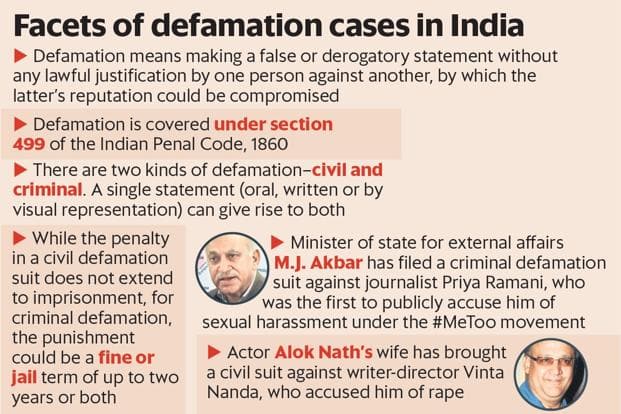How defamation laws can have an impact on #MeToo
#MeToo has pivoted to the legal stage, with Union minister M.J. Akbar filing a criminal defamation suit against journalist Priya Ramani and actor Alok Nath's wife bringing a civil defamation case against film-maker Vinta Nanda. Mint analyses various aspects of defamation cases.
 Premium
Premium
What constitutes defamation?
Defamation essentially means making a false or derogatory statement (oral, written or by visual representation) without any lawful justification by one person against another, by which the latter’s reputation stands to be compromised. It is covered under section 499 of the Indian Penal Code (IPC), 1860. Anyone who feels wrongly accused of something through words or gestures—spoken or written—can file a defamation suit in a court of law on the grounds that the accusation hampers his/her reputation. To constitute defamation, the statement has to be communicated to a third party.
What are the different kinds of defamation?
There are two kinds of defamation: civil and criminal. One statement can give rise to both. There is no codified law dealing with civil defamation. It is based on tort law that relies on the body of case laws to define what constitutes a wrong. The defamed person can move a high court or subordinate court and seek monetary compensation. The penalty doesn’t extend to a jail term. Under criminal defamation, the person against whom a defamation case is brought can be prosecuted under section 500 of IPC, which may include a fine or jail term of up to two years or both. The case has to be proved beyond reasonable doubt.
What is the SC ruling on criminal defamation law?
In May 2016, the Supreme Court upheld the constitutional validity of the colonial-era criminal defamation laws and ruled they were not in conflict with the right to free speech.
How do defamation laws fit into the context of #MeToo?
Some of alleged accused of sexual harassment, rape and assault under the #MeToo movement are taking recourse to the defamation law. Their argument is the allegations have caused irreparable damage to their reputation. The accused in the defamation cases are relying on penal provisions under IPC and the Sexual Harassment of Women at Workplace (Prevention, Prohibition and Redressal)Act, 2013, that supersedes the Vishakha Guidelines on sexual harassment.
Which are some of the prominent cases?
In April 2016, Kerala chief minister (CM) Oommen Chandy brought a defamation case against CPI(M) veteran V.S. Achuthanandan. Criminal and civil defamation suits were filed by Union minister Arun Jaitley against Delhi CM Arvind Kejriwal and other AAP leaders over allegations of financial irregularities during his term as chief of Delhi and District Cricket Association. Industrialist Nusli Wadia filed a criminal defamation case against Tata Sons, Ratan Tata and the Tata group board of directors in 2016.
Unlock a world of Benefits! From insightful newsletters to real-time stock tracking, breaking news and a personalized newsfeed – it's all here, just a click away! Login Now!



